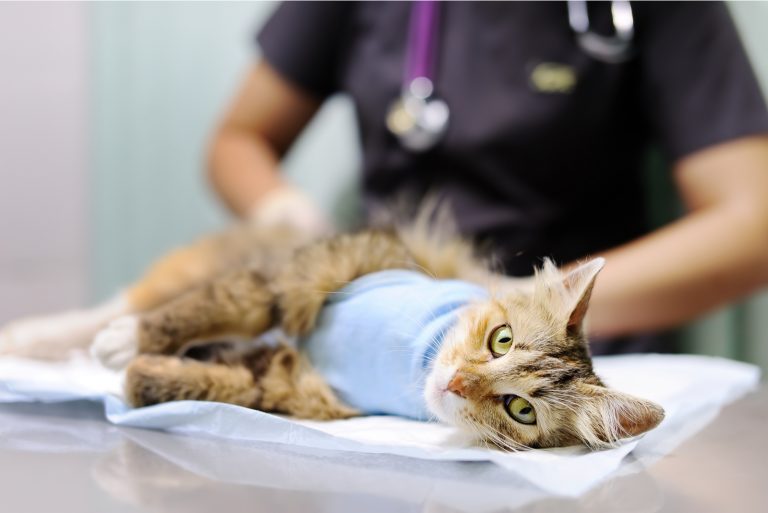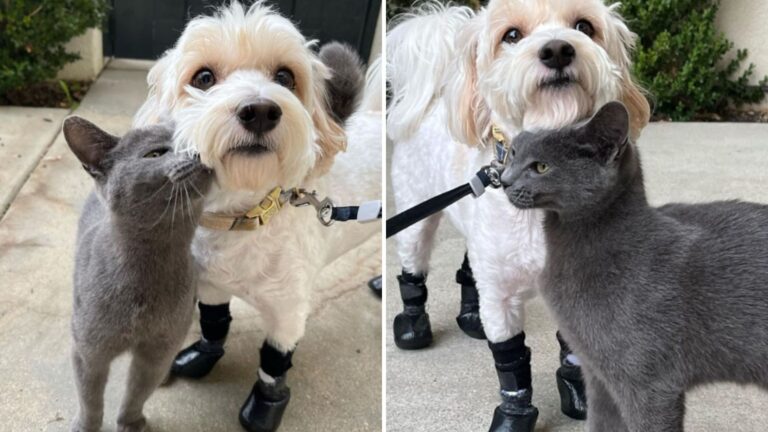Cat Suddenly Lethargic And Weak – Causes & Treatment Options
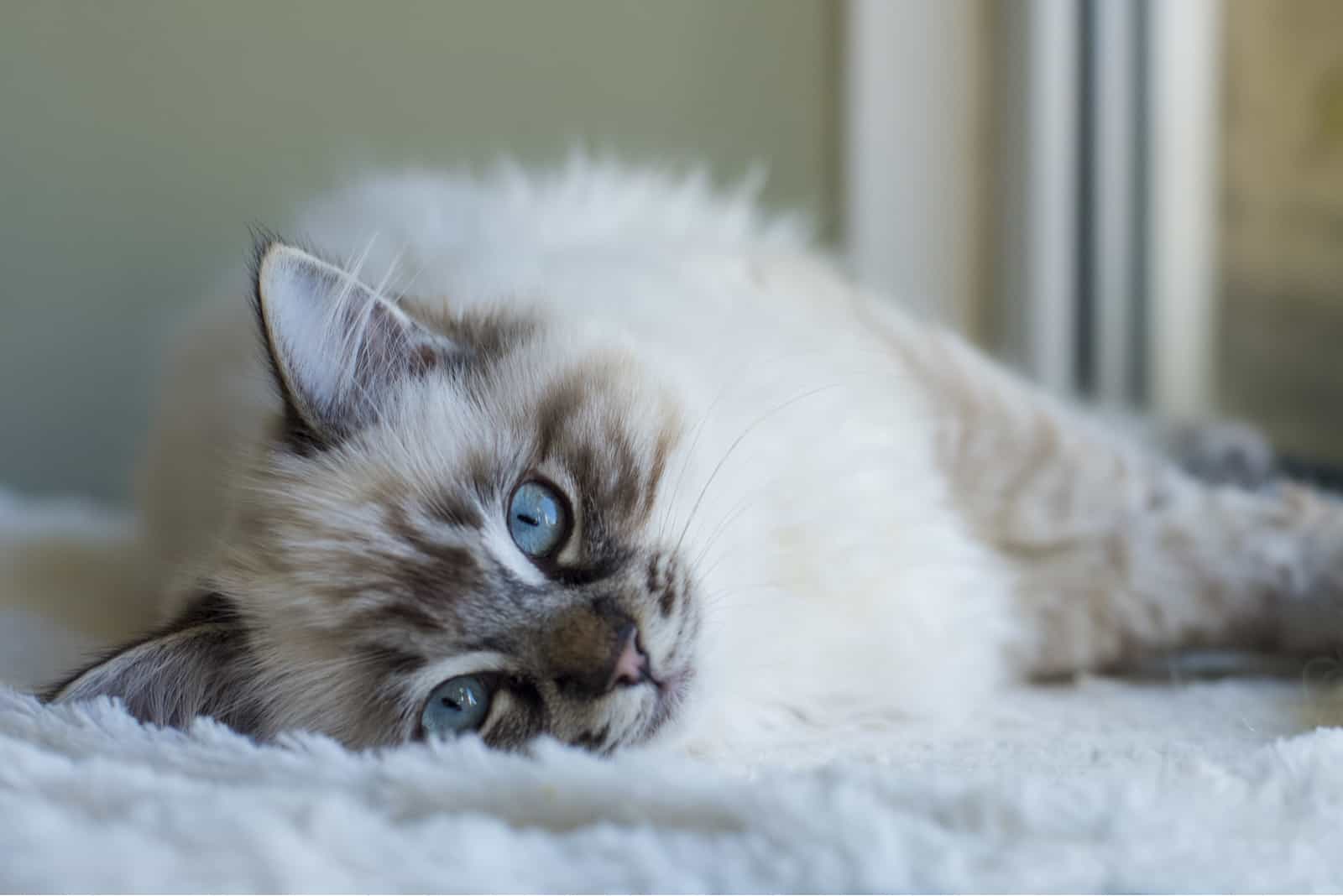
Cats are known to be very active and playful animals, especially during the night. However, at other times, they adore sleeping in their favorite spots in the house.
But what does it mean when your cat stops being active and, instead, starts sleeping most of the time, along with noticeable behavior changes?
These are usually symptoms of lethargy and weakness, which means that your feline lacks interest in things it likes, or it has low energy. Either way, lethargy and weakness may be a consequence of many medical conditions, from less serious to those extremely serious.
However, if you’re a cat owner who’s wondering why is my cat suddenly lethargic and weak, then this article is for you. Read on to find out the causes of a cat being lethargic and weak, what the symptoms are and how to treat it.
Why Is My Cat Suddenly Lethargic And Weak? 3 Possible Reasons
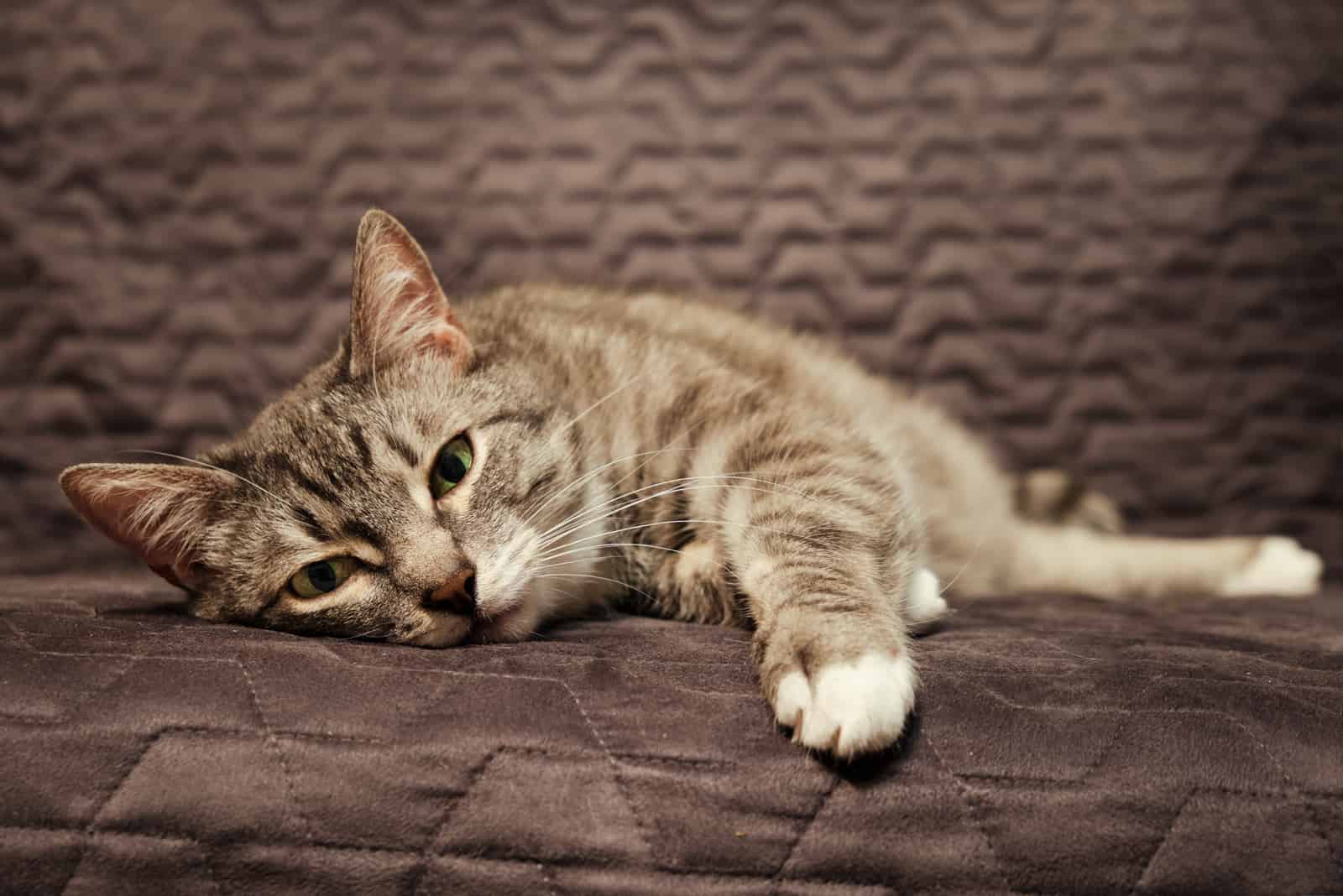
Every pet parent probably knows how cats change their behavior when they have certain problems. Cats cannot talk, so that is their only way to tell you that something is wrong and that they need your help.
However, if you notice your cat suddenly lethargic and weak, it would mean that they lack interest in playing, cuddling, or other things they used to adore. They’ll probably sleep most of the time and, in the worst case, won’t even eat.
These sudden behavior changes usually mean that something isn’t quite right and that your cat requires special care.
Within the following text, you’ll find three common reasons for your cat being lethargic and weak. Besides that, you’ll also learn the symptoms of lethargy as well as those relating to specific conditions so that you can easily recognize any possible health issues.
1. Less Serious Health Problems
In most cases, lethargy is a symptom of less serious health problems that don’t require special care, so you don’t need to worry that much. A simple vet-check would be enough to find the cause.
However, these problems also require proper treatment in order to try to cure them completely or, if that’s not possible, to keep the problem under control.
Take note of how the following issues can be common causes of lethargy:
Arthritis
Arthritis can make your cat’s life more difficult and increase their lethargic behavior. It is a degenerative disease that affects the cat’s joints, making it harder to move, jump, climb, etc.
This is a common condition for overweight and older cats that aren’t as active as before. If you notice your cat suddenly lethargic and weak with accompanying symptoms, such as struggles with walking or getting up, arthritis may be the answer.
Recent Vaccination
A recent vaccination can be the cause of lethargy and weakness in cats, which is completely normal. Vaccinations may cause dizziness, lack of energy, and/or even loss of appetite. Vomiting may also sometimes be a symptom. However, after a day or two, your cat will go back to their normal selves.
Respiratory Infection
This is another possible cause of your cat’s lethargy. It may deplete your cat’s energy while fighting the disease. A respiratory infection happens, of course, when a virus or bacteria infects the cat’s respiratory tract.
Other symptoms may include difficulty breathing, sneezing, coughing, and/or a runny nose. However, these are not life-threatening issues, so please stay calm. Your pet’s health will be completely fine after a week or two with the proper treatment.
Intestinal Parasitic Infection
A possible reason for your cat’s lethargy may be if their intestines become infected by parasites – worms. It’s a more common thing for kittens to happen because of the milk they drink.
However, if you notice your kitten not eating much, or eating enough but still looking skinny, it may have worms. Accompanying symptoms of parasitic infection may be weakness, weight loss, diarrhea, vomiting, and/or worms in the cat’s poop.
It’s very important to do a deworming treatment every once in a while, which can be done by injection or oral medication, which is more frequent.
2. Serious Health Issues
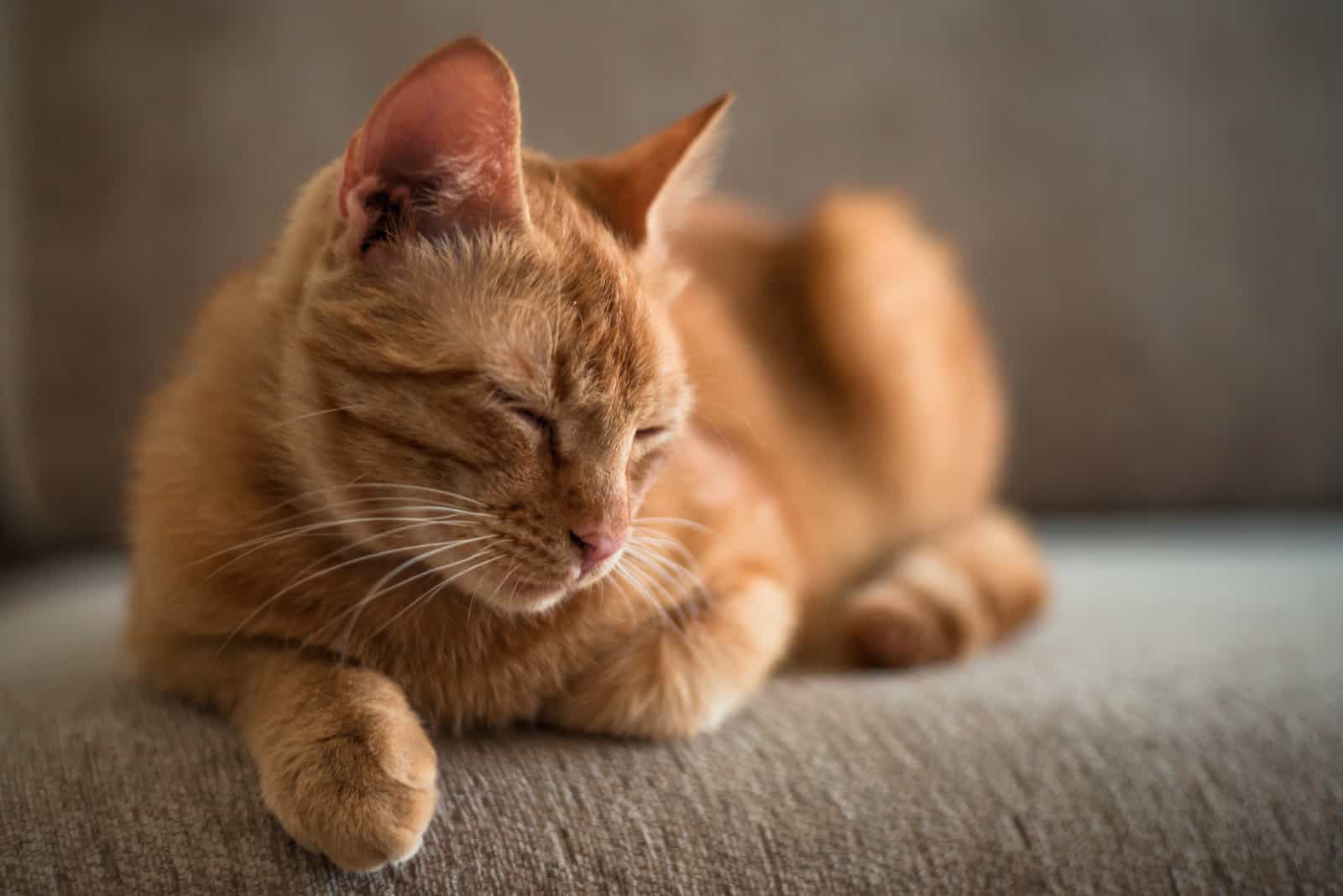
If you notice your cat suddenly lethargic and weak, it may also be a symptom of serious health issues, which may require special attention. Accordingly, if you notice any of the following issues, then you should visit your vet, just in case.
Abscess
An abscess is the body’s natural response to an injury, such as a cat bite. It may grow really big and bacteria can develop within it.
Because of that, it’s very important to take your cat to the vet for a checkup. They’ll clear out the fluid from the abscess and clean the wound. After that, you’ll have to treat your cat with antibiotics in order to reduce infection.
Anemia
Anemia is also one of the most common causes of lethargy. It happens when a cat lacks red blood cells and, therefore, there’s not enough oxygen for the parts that need it.
It may also happen due to fleas and ticks sucking your cat’s blood, which may result in your cat struggling with low energy leading to both weakness and lethargy.
Diabetes
Diabetes may also be the cause of lethargy and weakness. It happens when a cat’s blood sugar level varies. The accompanying symptoms of diabetes, besides lethargy, are weakness, lack of energy, excessive thirst, weight loss, and frequent urination.
A veterinary visit is crucial in this case. You should consult with your vet in order to treat your cat’s illness properly because keeping your cat’s health in good shape is a must!
Heartworm
Heartworm is a parasitic infection, but a very serious one. These heartworms can grow long, but their length depends on their gender. Females can grow up to 36 cm while males are half their size. The terrifying thing is that they can live for two to four years in a cat’s body.
However, this type of parasitic infection isn’t as common in cats as in dogs. But, it can still happen. The main culprit is mosquitos which can infect dogs or cats by biting them.
Symptoms, other than lethargy, are bad breath, breathing heavily, gagging, weight loss, coughing, diarrhea, and/or vomiting. Treatments for such an infection include medications or even surgery, if necessary.
Viral Infections
The two most common viral infections are the feline leukemia virus and the feline immunodeficiency virus. These two may be the cause of serious health issues in your cat, and lead to lethargy and weakness.
However, the feline leukemia virus is considered to be the worst because most vets suggest putting down cats that suffer from this because there’s simply no other solution.
Urinary Tract Infection
If you notice your cat being lethargic and not being able to use the litter box, it’s most likely that your feline suffers from a urinary tract infection. Ensure you pay more attention to their use of the litter box as well as to the possibility of blood in their urine.
However, if you believe that your cat may be suffering from a urinary tract infection, visit your vet, and they’ll take care of your furry friend in the best possible way.
3. Serious But Rare Health Problems
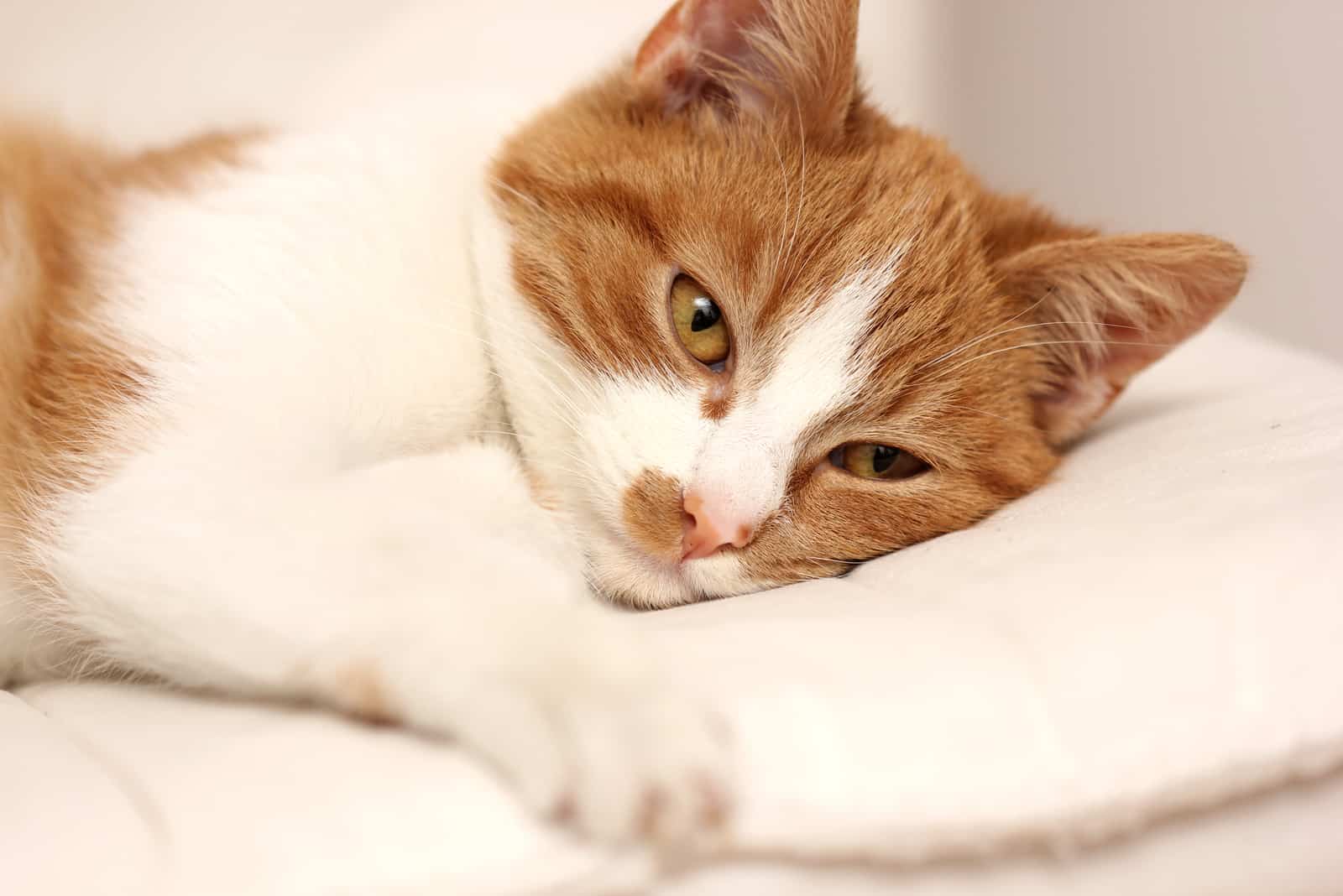
Heart Disease
It’s very difficult to recognize this condition in its early stages. But, as time passes by, it may cause your cat to feel lethargic and weak, due to poor heart function.
Other symptoms may include weight loss, low energy, and/or loss of appetite. These are sick cat symptoms that require emergency vet care.
Tumors
Tumors may also be a cause of a cat’s lethargy and weakness. The cat may be in pain and, therefore, may seem tired. However, it’s very important to find the underlying cause as soon as possible so that your cat can receive proper treatment.
Poisoning
Poisoning can often happen to cats as they adore exploration. However, if they ingest unknown substances or poisoned food, that may suffer bad side effects.
The cat’s condition depends on the level of poisoning. It can vary from being less serious to potentially deadly. That’s why it’s said that curiosity killed the cat! However, the vet will decide what treatment the cat’s condition requires, depending on the level of poisoning.
Heatstroke
Heatstroke may also lead to extreme lethargy because when cats get overheated they risk the functioning of their organs. Their heart rate, as well as their respiratory rate, may sharply increase causing them weakness, dizziness, and maybe even vomiting in some cases.
Organ Failure
Organ failure such as liver or kidney failure may also lead to your cat suddenly being lethargic and weak. Liver disease may have the same symptoms as kidney disease, such as loss of appetite, weight loss, low energy, vomiting, etc.
However, it’s very important to react in good time if you want your cat to fully recover. So, the best thing to do is to take your feline to the vet as soon as you notice the cat’s lethargy. It’s better to have it checked just in case, than to know you’re late with any kind of treatment.
Symptoms Of A Lethargic Cat
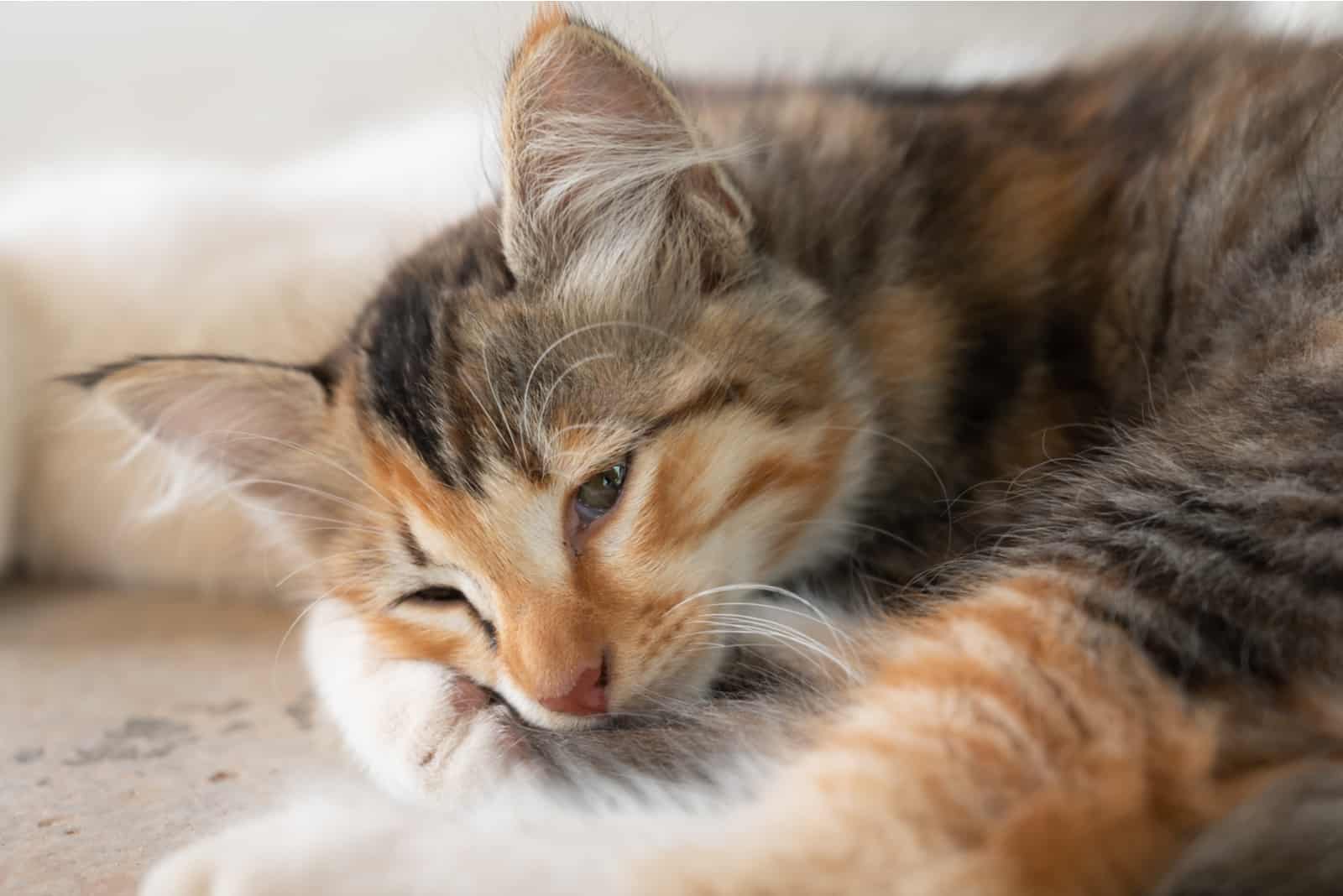
If you wondered why is your cat suddenly lethargic and weak, now you know that it’s usually because of certain health issues, and the only way to show you that something’s wrong is to change their behavior.
That’s why it’s always important to monitor your cat’s behavior because only that way can you find out if something’s wrong with your cat friend.
Symptoms of a cat’s lethargy are:
🐾 Lack of energy
🐾 Weakness
🐾 Low activity
🐾 Loss of appetite
🐾 Decreased interest in things
🐾 Tiredness
When your cat shows signs of lethargy, there are usually other symptoms that they show along with lethargy and weakness, which usually means that something is not good:
🐾 Hiding – cats are known to hide their pain, so if you notice your cat hiding from you often, it means she doesn’t want you to see her vulnerable. However, that should be a warning sign to react immediately!
🐾 Affection – if you notice your cat being increasingly affectionate besides being lethargic, it usually means she’s asking you for help. Every cat is different, so that means that not every cat will behave this way.
🐾 Sleeping position – besides sleeping most of the time, cats that suffer from some health issues that causes them to sleep in weird positions. They do it because they’re in pain and they’re trying to find the best position that will minimize their pain and discomfort.
🐾 Weight change – lethargic cats often suffer from frequent weight changes. However, weight loss is more frequent than weight gain in lethargic cats.
🐾 Hair loss – this may also happen in lethargic cats because their pain causes them to groom themselves excessively or even scratch the painful area, and that, of course, may result in hair loss in that particular area, and even more hairballs than usual.
Accompanying Lethargy Side Effect
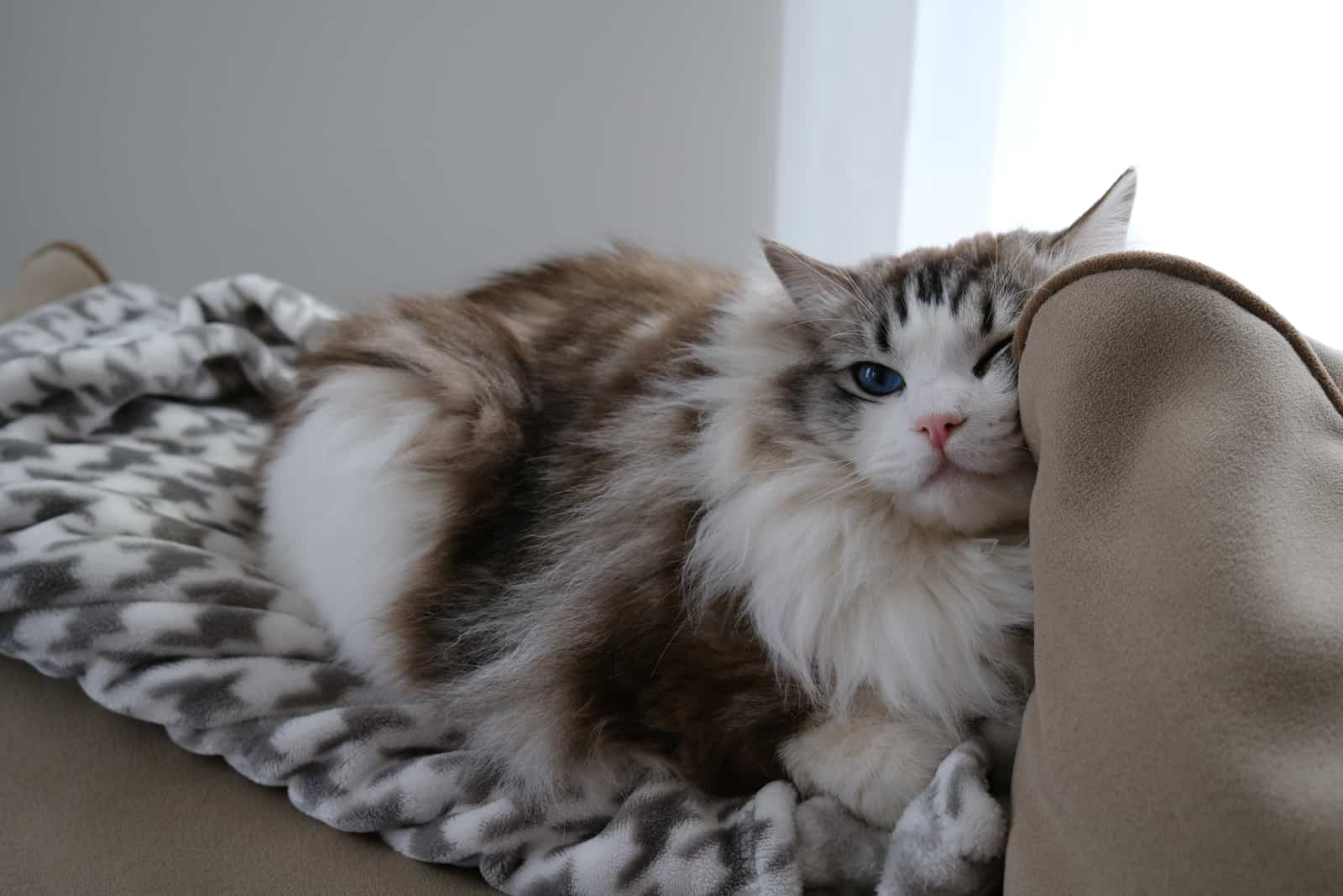
Lethargy has its accompanying side effects which may be concerning. So, if you notice your cat being lethargic and weak, make sure you keep a close eye on your cat, as well as on other behavioral changes.
It’s very important that you recognize these symptoms and react as soon as possible. So, let’s consider them!
🐾 Lack of interest in food – if you notice that your cat won’t eat, then it’s high time you start doing something. When cats stop eating, it often means that they’re in pain due to an intestinal blockage or similar issue.
It’s very important that you take your cat to the vet in order to avoid the risks of serious diseases such as kidney or liver disease, pancreatitis, tumors, or other issues that may put your cat’s health in danger.
🐾 Not drinking water – it’s very important that your cat stays hydrated, so if you notice your cat not drinking water, you should help her in order to prevent dehydration which can lead to many health issues.
🐾 Hiding – as previously mentioned, hiding may be specific to cats that don’t want to be seen as vulnerable and in pain. So, if you notice your cat often hiding from you, maybe it would be best to take it to the vet, just in case. However, some cats may act completely differently, asking for your help!
🐾 Drooling – when you see your feline drooling, don’t freak out, but that may be a big problem! Cats do it when having certain health issues and when they’re in pain. However, for anything you need, you know who you should call – your vet! They’ll know the best action to take!
🐾 Fever – when was a fever a good sign? Probably never. Fever may be another symptom that comes with lethargy. They may get a fever due to various infections, or other diseases such as kidney or liver disease, pancreatitis, or similar.
🐾 Difficulties with breathing – panting is not really common for cats. If you notice your cat panting, you should recognize that something is wrong. They usually do it because they have difficulties with breathing due to an injury or some other issues, such as lung problems. Either way, it’s very important to take her to the vet.
🐾 Vomiting – it may also come with lethargy because your cat’s exhausted from the pain it’s experiencing. However, pay attention to the frequency of vomiting.
If your cat vomits only once, it’s probably nothing serious. It may happen due to eating rapidly or some particular food. However, if your cat vomits multiple times a day, then you must act to find out why.
🐾 Weight loss – lethargy makes a cat uninterested in food, and if that continues to happen, it may lead it to lose some weight. You should pay attention closely to your cat if you notice this behavior, but mostly because weight loss may lead to other serious issues such as hyperthyroidism or diabetes.
High Time For A Vet-Check
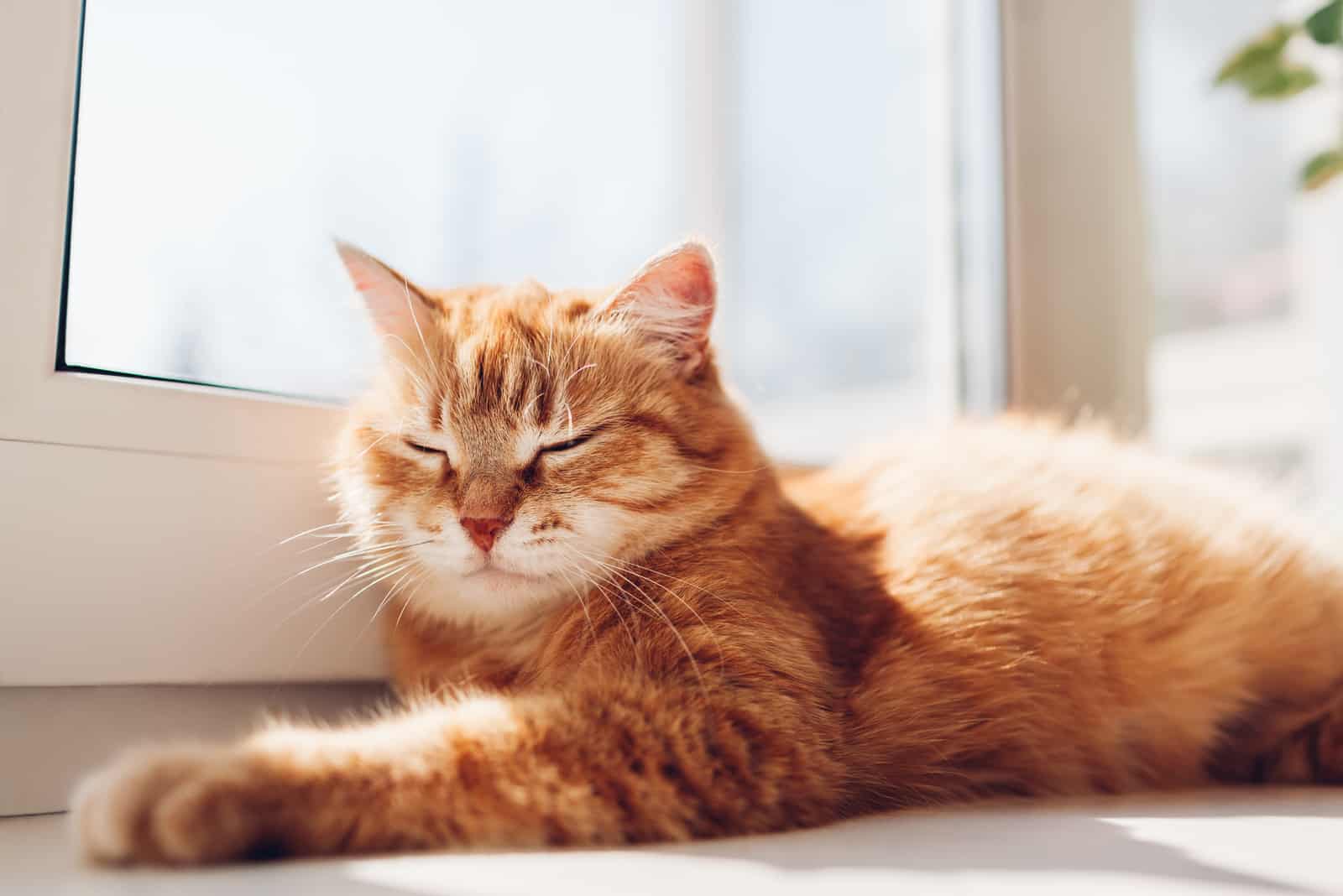
All in all, a cat’s lethargy doesn’t necessarily indicate serious health issues. But if you notice your cat’s behavior has changed, or any of the previously mentioned symptoms, then you should probably contact your veterinarian, just in case.
Make sure that you track your cat’s behavior, so that you can inform your vet of everything that happened to your feline. Don’t do anything by yourself, because the vet is the professional and they’ll know what’s the best thing to do.
The vet will probably do some tests in order to find the underlying cause of your cat’s lethargy. Some of these tests may be:
🐾 Blood work
🐾 Urinalysis
🐾 X-ray
🐾 Heartworm test
🐾 Parasite test
🐾 Feline leukemia virus – FELV test
🐾 Feline immunodeficiency virus – FIV test
Diagnosis may sometimes be hard to determine, because lethargy can be a symptom of many diseases, both less serious and more serious ones. Therefore, you have to be patient and let the vet do everything needed in order to find the main problem and treat it properly.
In addition, the treatment will depend on the type of illness. If your cat’s lethargy is only temporary and not caused by any serious diseases, then there’s no need to worry. The vet may prescribe some supplements that will improve your cat’s health, appetite, and energy.
Lethargy Treatment Options
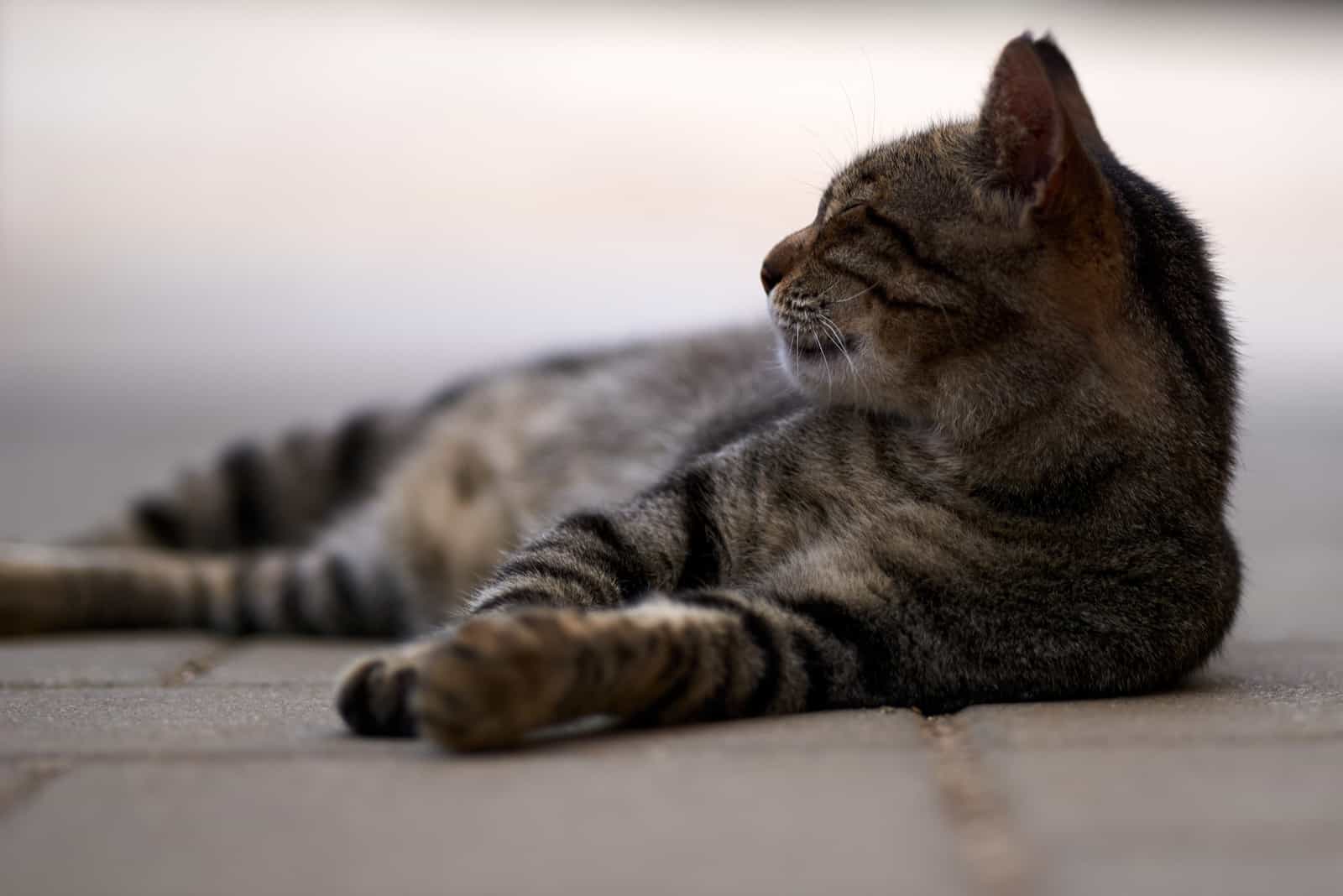
Be aware that lethargy treatment depends on the underlying cause. This means that after the vet determines the diagnosis, they’ll be able to give your cat a proper treatment.
Some of the treatment options include:
🐾 Medications for deworming
🐾 Antibiotic for infections
🐾 Medications for viruses
🐾 Supplements
🐾 Insulin for diabetes
🐾 Surgery for tumors or similar diseases
🐾 Painkillers
🐾 Intravenous fluids
Also, you should know that recovery also depends on the diagnosis, in addition to the cat’s condition and age. For example, senior cats may have a longer recovery period than younger ones.
However, if you react in time, with proper treatment you won’t need to worry. Your cat will be safe and healthy within a blink of an eye!
FAQ
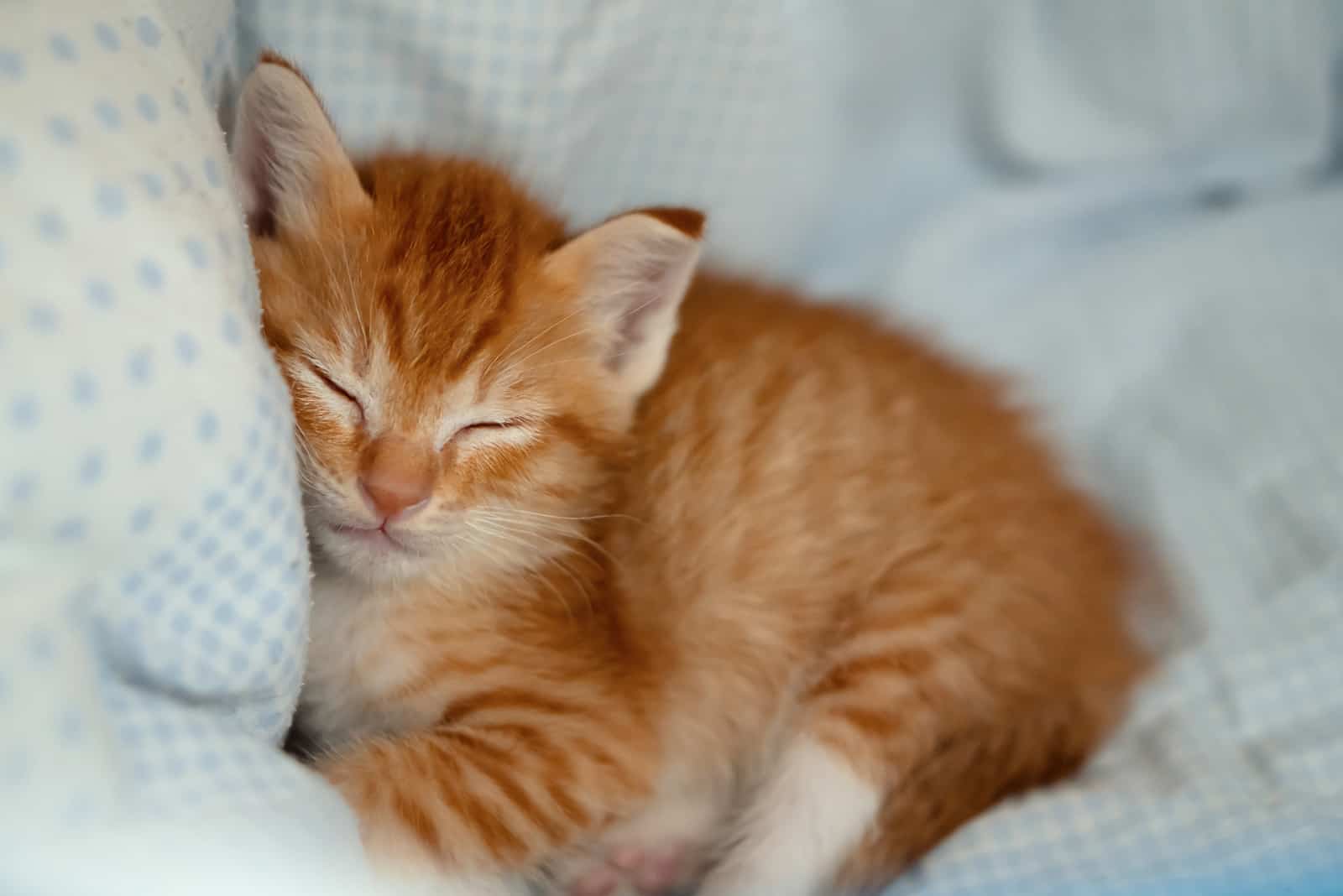
Is A Lethargic Cat An Emergency?
A lethargic cat doesn’t necessarily need to be an emergency, but in order to prevent further possible complications, it won’t hurt you if you take your cat to the vet for a check-up.
Is A Lethargic Cat A Sign Of Illness?
If your cat continues to be lethargic after 24 hours, and if, in addition, it starts showing other symptoms that are specific to lethargy, then this may indicate that your cat is sick.
However, these illnesses may vary from less serious to extremely serious, therefore, it’s very important to find the underlying cause so that your cat can receive proper treatment.
When Should I Worry About My Cat Lethargy?
If your cat continues to show signs of lethargy and other accompanying symptoms after 24 hours, then you should make an appointment to see the vet. Better safe than sorry.
How Long Does Cat Lethargy Last?
How long cat lethargy lasts may depend on the diagnosis, that is, less serious issues may not last long, especially if treated properly. While serious health issues may last longer. Moreover, it also depends on the cat because some may recover quicker than others.
All In All
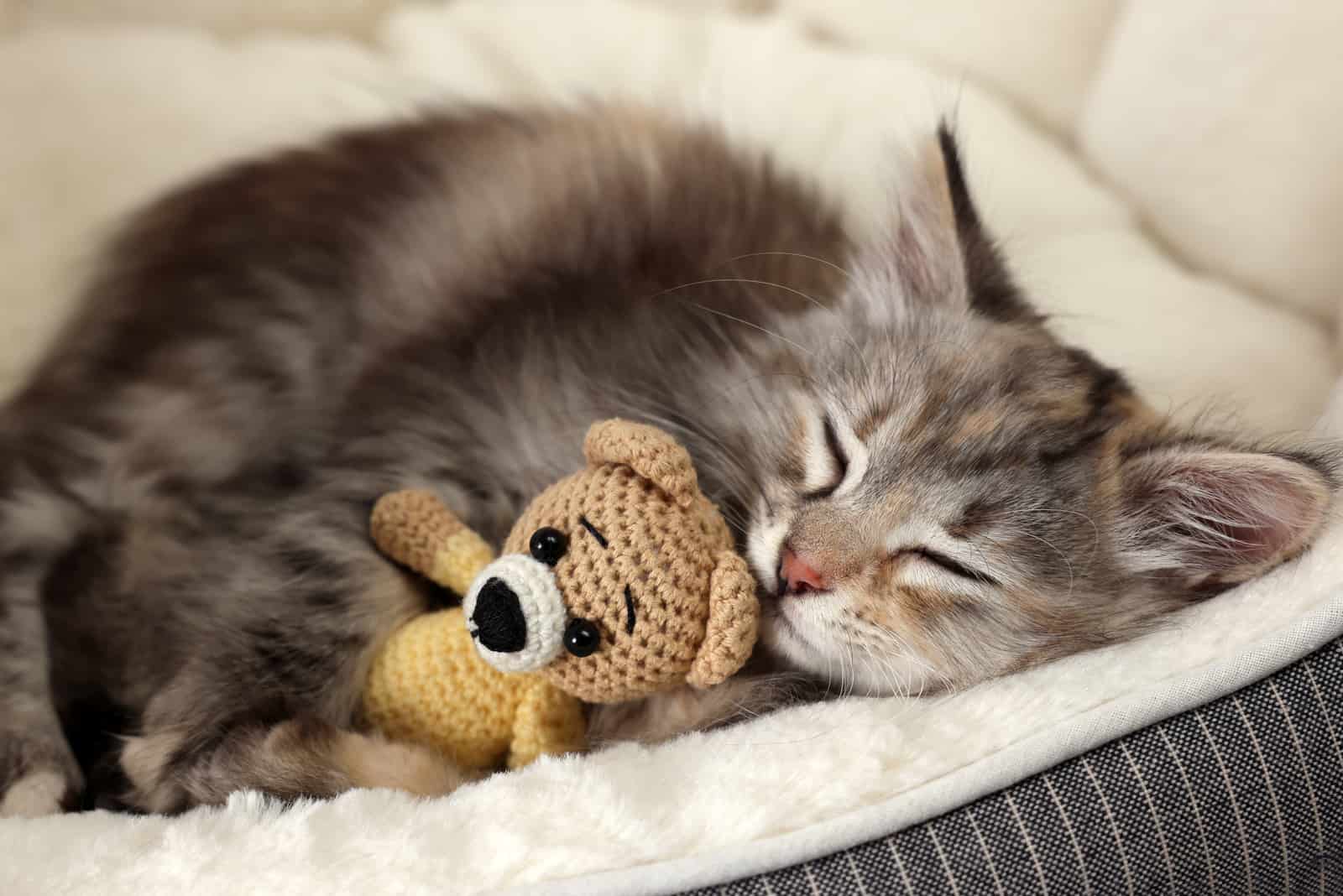
So, if you wonder why is your cat suddenly lethargic and weak, then this article can be really helpful to you.
Usually, lethargy isn’t a serious condition, however, it may indicate some less serious or more serious illnesses.
It’s very important to know what the possible accompanying lethargy symptoms are as that may be really helpful in determining the underlying cause.
Make sure that you monitor your cat’s behavior and contact your veterinarian if you notice anything suspicious. You should also inform your vet of every little change in your cat’s behavior in order to help them in determining a diagnosis.
The vet will run some tests in order to see what caused the changes in your feline’s behavior and provide proper treatment according to the diagnosis.
However, you shouldn’t worry, because that’s what vets are for. they’ll do anything to help your kitty, and your job is to be patient and react as soon as you notice unusual changes in your cat’s behavior.


